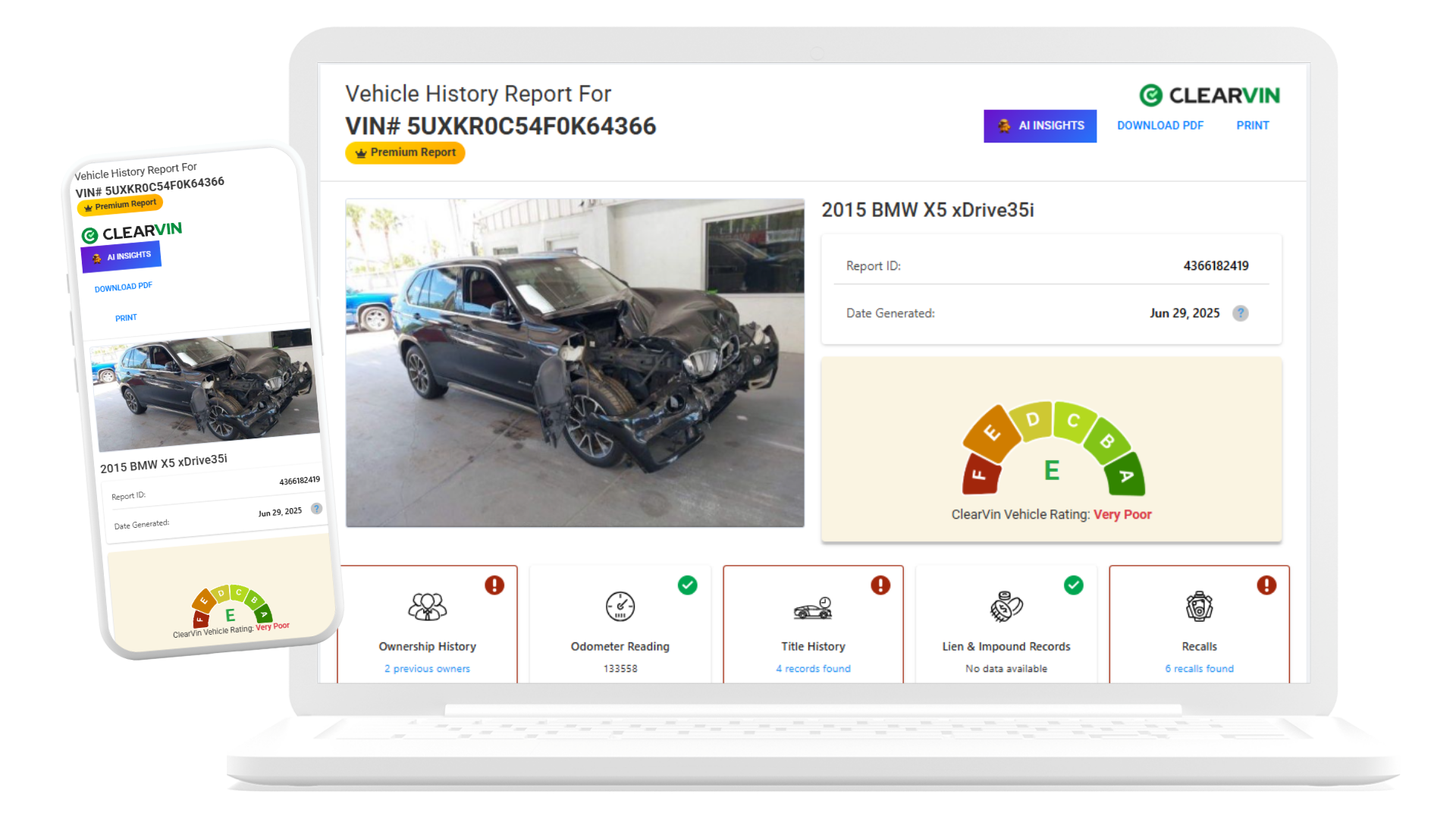
Avoid Car Buying Scams: Do This First Before Buying a Car
Found your dream car? Follow these 5 simple steps to avoid scams and buy with confidence
Anyone searching for their perfect car online needs to understand how to spot and avoid car buying scams. These scams are becoming more common, with many listings that look convincing but are set up to trick buyers out of their money. Taking a few careful steps helps prevent costly mistakes and disappointment.
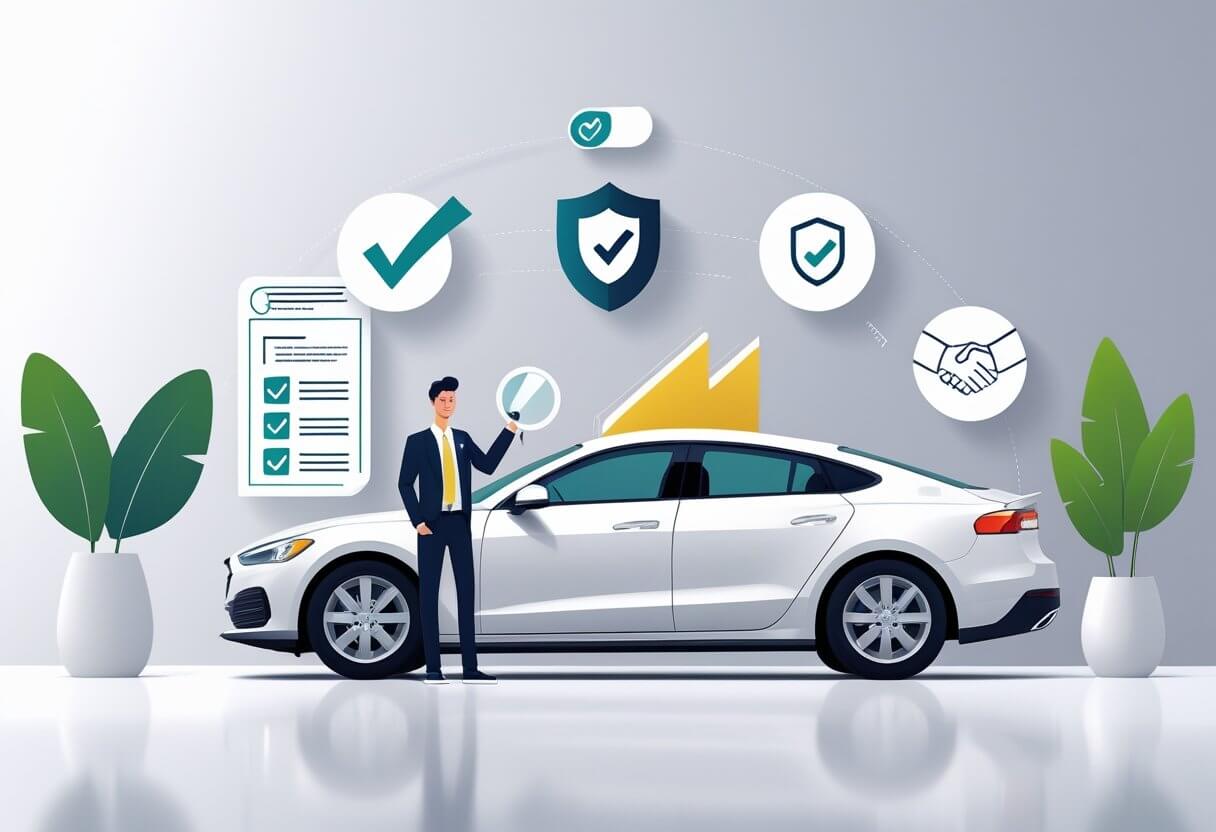
Most car buying scams rely on urgency, fake promises, or pressure to complete the deal quickly. By staying cautious and following a reliable process, you can protect yourself during the car buying experience and avoid unnecessary risks.
These five straightforward tips will show you how to stay safe, recognize car buying scams, and buy your dream car with confidence.
If you want step-by-step guidance on inspecting a used car and checking its VIN to avoid mistakes, check out How to Buy a Used Car: Inspect, Check VIN, Avoid Mistakes
Recognizing Common Car Buying Scams
Car buyers often encounter scams, fake websites, and deceptive communications. Recognizing these risks can prevent them from falling victim to fraud and phishing scams.
Scam Type | Red Flags to Watch Out For | How to Avoid |
|---|---|---|
Fraudulent Sellers | Price too low, seller refuses in-person meeting, vague answers | Always meet in person, verify ID, demand full VIN report |
Fake Websites | Misspellings, unusual domain names, no contact info | Check for “https://”, research reviews, use only trusted dealer websites |
Phishing Emails | Urgency, fake invoices, links asking for login/payment details | Don’t click unknown links, contact seller/company directly |
Upfront Fees Scam | Seller asks for “shipping” or “holding” fee before inspection | Never pay before seeing the car; legitimate sellers don’t charge extra fees |
Fake Check Scam | Overpayment, buyer asks you to refund the difference | Never accept checks above price; wait until the bank fully clears the payment |
Odometer Rollback | Low mileage not matching wear, service gaps in records | Run VIN history, check service records, look for signs of tampering |
Stolen Car Sales | Suspicious documents, mismatched VIN, seller avoids questions | Cross-check VIN with stolen vehicle databases (NMVTIS, NICB, VINspectorAI) |
Spotting Fraudulent Sellers
Fraudulent sellers may use tactics such as offering vehicles below market value, insisting on fast transactions, or refusing to meet in person. They sometimes avoid sharing full vehicle histories or provide suspicious-looking documents.
Scam alerts often include sellers demanding payment through unconventional means, like wire transfers or gift cards, making it hard to recover lost money. Potential buyers should always request to see the car in person and ask for a legitimate vehicle history report.
An honest seller will answer questions directly and provide verifiable contact information. Any pressure to complete a sale quickly or reluctance to meet should be seen as a major warning sign.
Identifying Fake Websites
Fake websites can appear professional but will often have inconsistencies in their design, such as poor grammar, unusual web addresses, or broken links. Misspelled company names and lack of legitimate contact details are common indicators of a scam site.
Online scams frequently use fake car dealer websites to collect personal and financial information. Before entering any data, buyers should look for secure website indicators, such as "https://" and a padlock icon in the browser address bar.
Legitimate sites will have clear policies, valid contact information, and customer support channels. If a site seems suspicious, researching online reviews or using website verification tools can help confirm its authenticity.
Avoiding Phishing Emails and Scams
Phishing emails related to car buying often mimic messages from trusted companies or sellers. These emails may include urgent messages, fake invoices, or clickable links that lead to phishing websites designed to steal sensitive information.
Common red flags include poor grammar, requests for confidential details, and threats about losing an opportunity if immediate action is not taken. Buyers should never click suspicious links or download attachments from unfamiliar sources.
It is best to contact the company or seller directly using verified contact details if an email seems suspicious. Using strong spam filters and regularly updating passwords can further reduce the risk of falling for a phishing attack.
Many listings appear perfect at first glance but hide serious problems. Running a VIN check can reveal these red flags — read How to Spot Hidden Problems in Used Car Listings With VIN to learn more.
Research and Verification Before Purchase
Thorough research is crucial when evaluating a car to avoid costly mistakes. Careful verification can protect buyers from scams, hidden issues, and investment opportunities that are too good to be true.
Investigating the Vehicle’s History
Buyers should collect the vehicle identification number (VIN) or chassis number. With this information, they can access resources or paid databases to check for previous accidents, theft records, and salvage titles. Look for records of flood damage or odometer rollbacks as these can signal deeper problems.
Key points to check:
Accident history: Review any claims, repairs, or insurance involvement.
Service records: Look for routine maintenance and documentation of repairs.
Ownership history: Confirm seller’s ownership period and the number of prior owners.
A lack of complete documentation or missing records can be a warning sign. Trusted sellers will openly share these details and may even provide a printed report.
To further help with assessing condition before purchase, don’t skip our [Inspection Checklist: Spot Hidden Damage Before You Buy] for guided tips on what to look for.
Understanding Market Pricing
Researching the fair market value of the specific make, model, year, and condition is essential. Use price guides, auction results, and local listings. An unusually low price may signal a scam or a car with major problems.
Consider the following checklist:
Compare similar listings in the same region
Check for price trends over the last year
Adjust for mileage, condition, and features
When investment opportunities are involved, undervalued cars might seem appealing but often come with risks. Buyers should avoid sending deposits or payments without first seeing the vehicle and documents.
Validating the Seller’s Identity
It is important to confirm who the seller is before moving forward. Request government-issued identification and cross-check with the name on the vehicle registration. Avoid sellers who refuse to meet in person or provide clear contact details.
Verify seller information by:
Meeting in a safe, public place.
Confirming the seller’s address matches official documentation.
Looking up phone numbers or email addresses for connections with known scams.
Extra research on the seller’s reputation, such as reviews or complaints, helps protect against fraud. If something feels off, it is safer to walk away and seek legitimate investment opportunities elsewhere.
Protecting Your Personal and Financial Information
Scammers often attempt to steal sensitive data during car-buying transactions. Knowing how to limit exposure and recognize red flags is essential to safeguard both money and identity.
Safe Sharing of Sensitive Information
When communicating with sellers, only provide the minimum information required to proceed. Avoid sharing details such as your Social Security number, bank account, or full address until you have verified the legitimacy of the transaction.
Use secure payment methods that offer buyer protection, such as credit cards or reputable escrow services. Never send money through wire transfers, prepaid gift cards, or untraceable apps. If a seller pressures for information or asks for payment through unfamiliar channels, this is a strong warning sign of fraudulent activity.
Double-check all platforms and websites for secure connections, indicated by "https://" and a padlock icon in the browser. Avoid sending sensitive data over public Wi-Fi, as it may be intercepted.
Guarding Login Credentials
Never use the same login credentials across multiple sites, especially for car-related listings or forums. Create strong, unique passwords for each account, and enable two-factor authentication on platforms that support it. This reduces the risk that a breach on one site could compromise others, including banking and email accounts.
Never share passwords or access codes with sellers or buyers, regardless of the reason given. Legitimate transactions will not require access to your account. Be wary of phishing emails or texts posing as official websites; always navigate to official pages directly rather than clicking on links in messages.
Keep device software and security tools up to date. Regular updates help protect against vulnerabilities that scammers may exploit to gather login information.
Avoiding Identity Theft
Identity theft can occur if personal or financial details fall into the wrong hands during the car-buying process. Scammers may use information such as your driver’s license, Social Security number, or credit card details to open fraudulent accounts or commit other crimes.
Watch for unexpected requests for sensitive documents, especially before seeing the car or verifying the seller’s identity. Request alternate verification methods or in-person meetings when possible.
If identity theft is suspected, contact financial institutions and credit bureaus immediately. Report the incident to the authorities and use resources like identitytheft.gov to take further action and mitigate damage. Stay vigilant after the transaction to catch signs of misuse early.
Securing Your Online Transactions
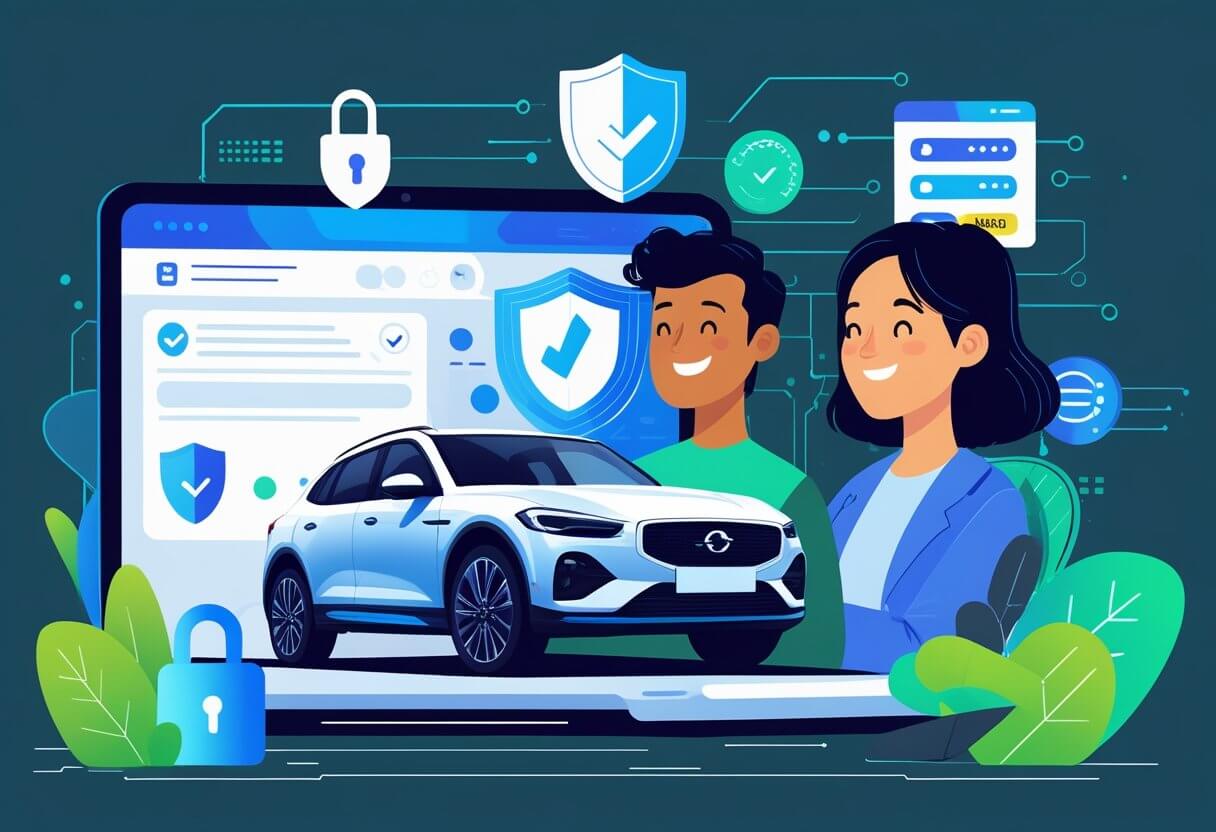
Protecting digital payments requires careful authentication, reliable security tools, and staying alert to online threats. Being proactive helps minimize the risk of losing sensitive information or funds when making big purchases.
Using Multi-Factor Authentication
Multi-factor authentication (MFA) adds a second confirmation step when logging into accounts. This often involves entering a code sent to a phone or email after inputting a password. Even if someone has the password, they still need this second piece of information to gain access.
Using MFA is one of the most effective ways to secure digital transactions. Two-factor authentication (2FA) is a common type of MFA, and it's widely available on payment platforms and banking services. Always enable these features in account settings to make unauthorized access much harder.
For those concerned about convenience, many platforms allow trusted devices, so the second factor isn't always required from recognized computers or phones. This balances security and usability for frequent users. MFA helps prevent scams by requiring more than just passwords to transfer money or view private information.
Enabling Security Software
Security software is critical for guarding devices against malware. Good security suites include anti-virus, anti-malware, and firewall features. These tools scan for harmful programs and block suspicious activity.
It is important to keep software up to date by enabling automatic updates whenever possible. Updates address vulnerabilities that criminals might exploit. Without current protection, devices are susceptible to new forms of ransomware or malware.
Some platforms also offer browser extensions that check for phishing sites before they load. This helps users avoid accidentally entering personal data on fraudulent websites. Regularly scanning computers or phones for threats further reduces risks.
Recognizing Ransomware Risks
Ransomware is a type of malware that locks files and demands payment for release. Transaction scams sometimes involve infected links or fake attachments, which can install ransomware if downloaded.
Checking sender information and avoiding unsolicited downloads reduces exposure to ransomware attacks. Legitimate sellers do not pressure buyers to open files or click urgent links. When in doubt, verify with the supposed sender using a trusted contact method.
Backups are an effective defense against ransomware. Keeping copies of important documents—stored offline or in cloud services not directly connected to the device—can prevent total data loss if attacked. Taking these precautions lowers the chance of falling victim to ransomware during the car buying process.
Handling Payments Safely
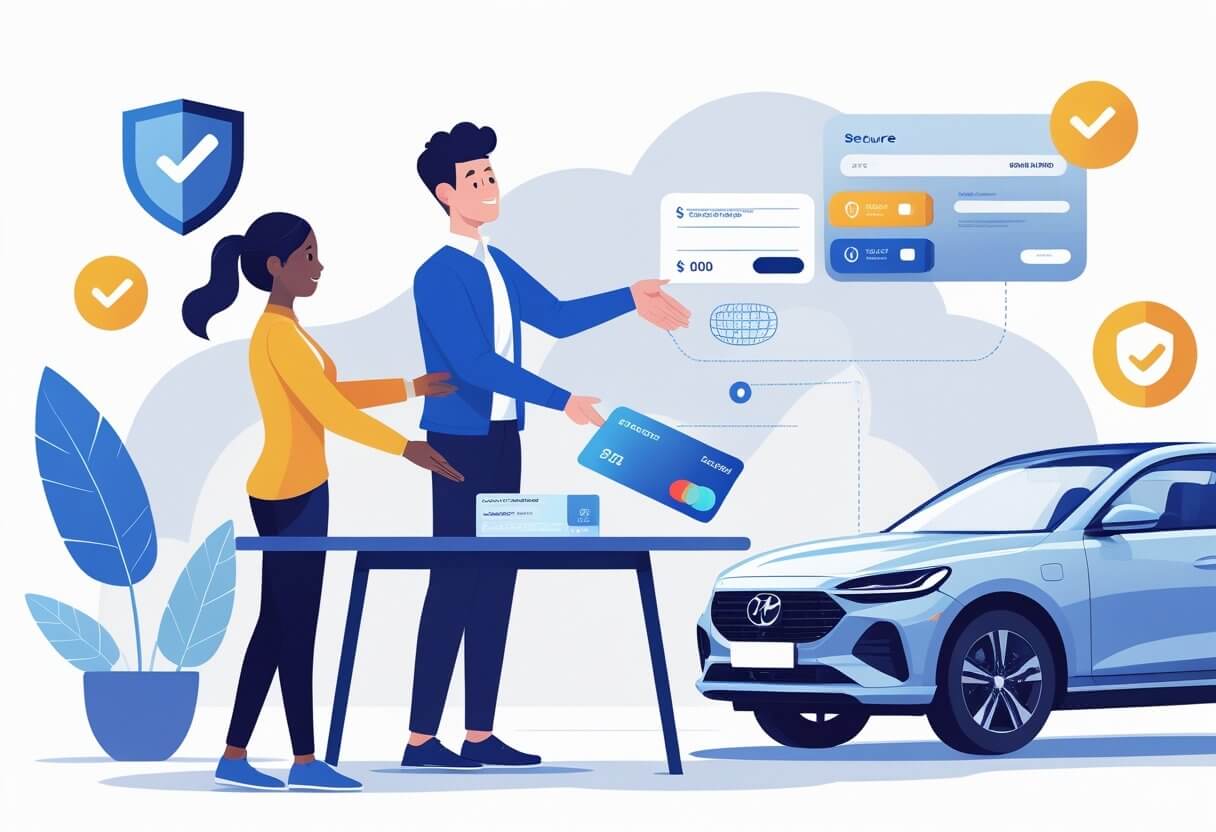
Staying secure during a car transaction involves careful selection of payment methods, awareness of common fraud tactics, and understanding warning signs such as requests for unnecessary upfront fees.
Choosing Secure Payment Methods
It’s safest to use traceable and secure payment options when buying a car. Methods like credit cards, direct transfers between verified bank accounts, or services with strong buyer protection help limit risk in case of fraud. Credit cards offer additional safeguards, such as the ability to dispute charges in the event of a scam.
Avoid sending money via wire transfers, cash, cryptocurrency, or gift cards, as these methods make it almost impossible to recover lost funds. When possible, meet at a bank to complete transactions in person. This setting adds a layer of verification and deters scammers from pushing deceitful payment tactics.
If a seller resists secure payment suggestions or pushes for an alternative method, this can be a red flag. Buyer and seller details should always be double-checked before processing any transaction.
Avoiding Upfront Fees
Legitimate sellers do not require buyers to pay unnecessary upfront fees. Scammers may invent fees for shipment, paperwork, or "holding" services. These fees are typically non-refundable and a common tool used in fraudulent schemes.
It's important to clarify what fees, if any, are standard for the deal being considered. Check if the dealership or individual has a transparent breakdown of costs. Never send payment for fees before verifying the car, title status, and seller’s identity.
If asked to wire money, deposit to an unfamiliar bank account, or pay for unverified services in advance, it’s safest to walk away. Keep written records of all agreements, and use payment methods that provide receipts and legal backing.
Watching Out for Fake Check Scams
The fake check scam often starts when a buyer receives a check for more than the agreed amount, with instructions to "refund" the difference. Once deposited, a bank may temporarily clear such checks, but it can take days or longer to detect a fake.
If the buyer spends or refunds any amount before the check is officially cleared, they are responsible for the loss, leading to possible overdraft or debt. Never accept or deposit checks from unfamiliar sources or for more than the sale price. Legitimate buyers and sellers rarely offer overpayments.
Any insistence on fast refunds or urgency in cashing checks is cause for suspicion. Banks, credit unions, and financial institutions emphasize not to spend funds from any check until it fully clears. Stick to known, safe payment channels to avoid these risks.
Managing Finances and Budget Wisely
Purchasing a vehicle requires careful attention to spending limits, credit health, and the security of banking activities. Each step plays a vital role in keeping personal finances safe and under control through the entire process.
Setting a Realistic Budget
First, determine how much can be safely spent without risking essentials like rent, food, or ongoing bills. Calculate all car expenses—including the purchase price, registration fees, insurance, maintenance, and fuel—before making a decision.
Subtract these amounts from monthly income and assess how much remains for other needs. If monthly payments are required, consider how interest and loan term affect the total paid. Setting aside a savings buffer for repairs or emergencies adds more financial stability and avoids future stress.
Maintaining Your Credit Score
A strong credit score may reduce interest rates on car loans, making monthly payments more manageable. Before applying for any financing, it is important to check for mistakes on credit reports and dispute any errors.
Avoid opening multiple new credit accounts around the same time, which can lower scores. Regularly paying existing bills on time also preserves a positive record.
If a car loan is needed, only apply for reasonable amounts and ensure loan providers are legitimate to avoid predatory lending. Ask lenders how loan approval or denial could impact a score, especially with multiple applications in a short period.
Protecting Your Personal Banking
Never share access to online banking, debit cards, or account numbers with sellers. Use secure payment methods, like verified bank transfers or escrow services, instead of cash or wire transfers to strangers.
Monitor online banking accounts for unusual withdrawals or deposits during the purchase process. Enable two-factor authentication for online and app-based banking to add an extra layer of protection.
If suspicious account activity occurs, contact the bank right away and change passwords. It is safest to keep personal information private and only deal with licensed, trustworthy parties throughout the transaction.
Legal and Professional Support When Needed
Dealing with complex vehicle purchases or suspected scams can require outside help. Knowing when and how to use legal experts or report wrongdoing can make a difference in protecting your interests.
Accident History Report: Check Car Damage Before You Buy — very helpful to understand crash-damage, title issues, and what to look out for.
Consulting an Attorney
When contracts, payment disputes, or unclear ownership records arise, consulting an attorney is recommended. Legal professionals can review documents, clarify confusing language, and ensure there are no hidden conditions in the sale. This reduces the risk of signing agreements that waive rights or contain unfair clauses.
An attorney can also assist if a seller refuses to provide critical documents such as a bill of sale or title. If buyers feel pressured or sense misrepresentation, immediate legal advice helps prevent irreversible mistakes. While hiring an attorney is not always needed, their experience is crucial if high-value assets or large sums of money are involved.
Most attorneys specializing in vehicle sales or fraud offer flat-fee consultations. This allows buyers to quickly get advice and reduce the chance of loss without significant cost.
Reporting Fraudulent Activity
If fraudulent activity is suspected, swift reporting increases the likelihood of resolving the issue. Common scam indicators include requests for payment through unusual channels, fake vehicle histories, or attempts to manipulate legal documents.
Buyers should gather all evidence such as emails, texts, payment receipts, and advertisements. Reporting fraud can be done through:
Local law enforcement
Federal Trade Commission (FTC)
State consumer protection agencies
Dedicated online fraud reporting platforms
Statistic | Data / Percentage | Source / Note |
|---|---|---|
U.S. car buyers targeted by scams | ~1 in 10 buyers | |
Total losses from online car scams (2023) | $55+ million | FTC |
Most common scam method | 42% fake online listings | FTC, NICB |
Phishing emails & fake websites | 31% of cases | FTC |
Fraudulent payments (wire/gift cards) | 27% of cases | NICB |
High-risk states | Florida, Texas, California, New York | FTC complaints |
Risk reduction with VIN check | ~70% fewer scams reported | NICB estimate |
Buying a car should feel exciting, not stressful. By taking a few extra steps, you can avoid falling victim to car buying scams and make a choice you’ll feel good about for years to come.
If you’re unsure about a listing, start simple: check the VIN. A quick vehicle history report can reveal accidents, flood damage, or title problems that sellers might not mention. Tools like VINspectorAI make this process easier by using AI to highlight hidden risks.
Frequently Asked Questions
Get answers to common questions about Avoid Car Buying Scams: Do This First Before Buying a Car
Uncover Complete Vehicle History Reports
Discover critical vehicle information before you buy. Our VIN decoder reveals accident records, title status, recalls, and service history to help you make informed decisions.
Related Articles
Explore Tags
More from Car Maintenance Tips
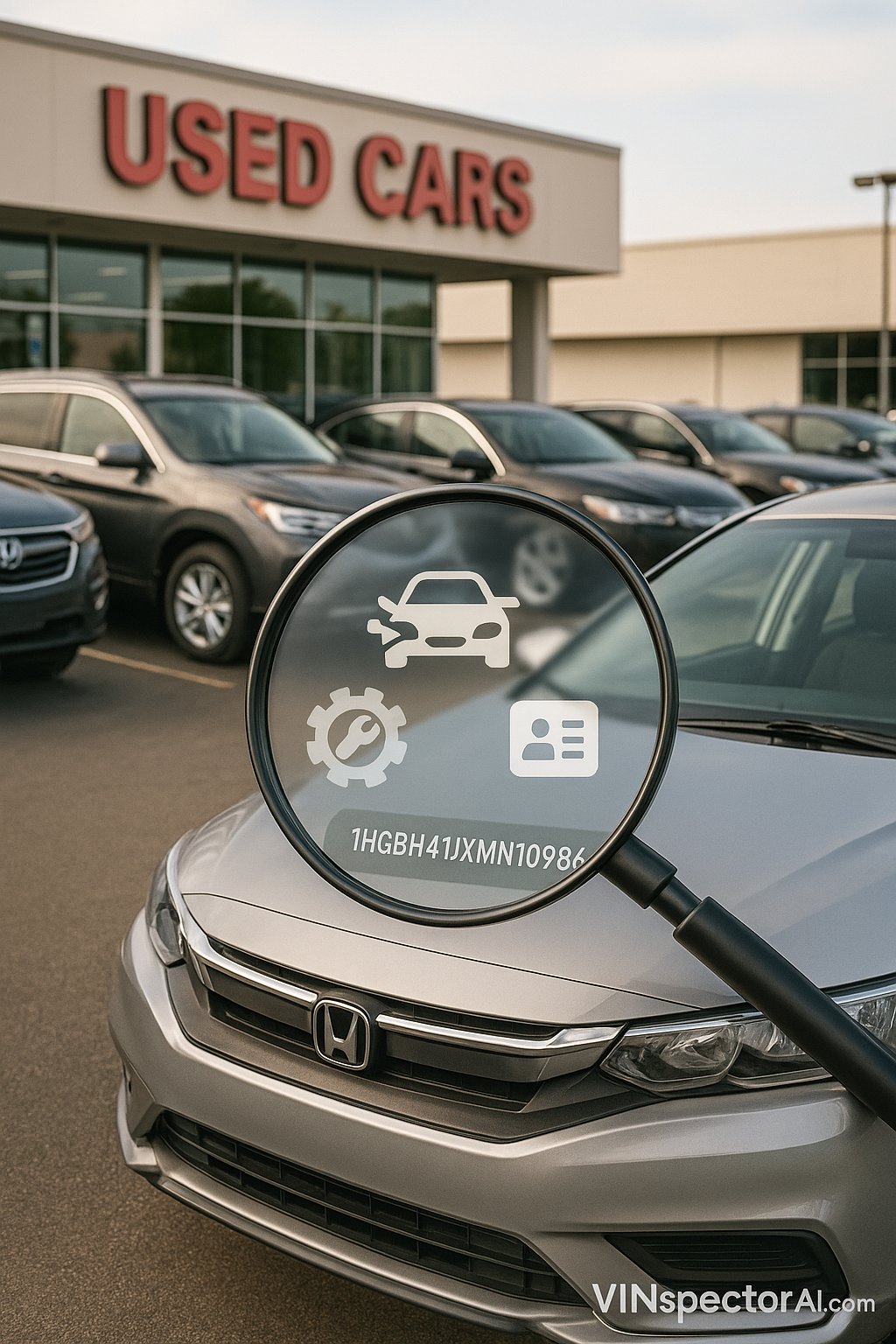
Learn how detailed VIN reports help you verify accident, title, and maintenance history before buying a used car in the USA. Stay informed and avoid costly surprises.
